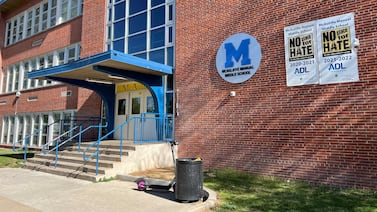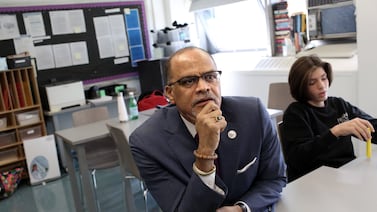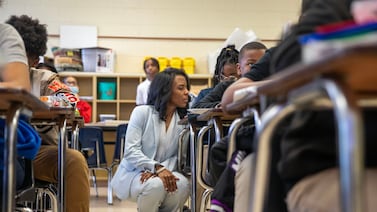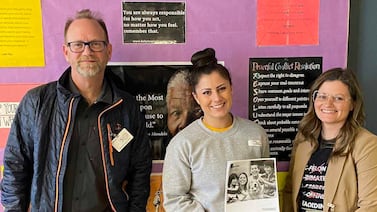Chicago’s Board of Education made waves last month when officials revealed a vision to move away from its school choice system and boost neighborhood schools.
The declaration, included in a resolution the board passed in December, lays out priorities for the district’s five-year strategic plan, which will be finalized this summer. Any resulting changes will depend on feedback from the community, board members said.
But the board’s new vision immediately sparked misinformation. Here are three things to know about the board’s resolution.
Will schools close?
No. Not yet, at least.
The resolution does not say anything about closing schools. State law put a moratorium on school closures in Chicago until Jan. 15, 2025, the same day a new 21-member, partially-elected school is set to be sworn in. The current seven-member school board, appointed by Mayor Brandon Johnson, would not be able to close schools of any type – charters, magnets, or neighborhood schools – until that time.
School board member Elizabeth Todd-Breland did indicate the board is scrutinizing charter school performance through the usual renewal process and questioned whether poor-performing operators should “continue to exist.”
But even a recent board decision to revoke a charter agreement with Urban Prep did not ultimately mean those schools closed. First, the district proposed operating the two campuses as district-run schools. But after a court order, the board extended Urban Prep’s charter until June 2024.
Will I have to go to my neighborhood school?
No. The resolution does not say anything about requiring families to attend their neighborhood schools.
The closest it comes to addressing enrollment policies is a bullet point about a “reimagined vision” that includes a “transition away from privatization and admissions/enrollment policies and approaches that further stratification and inequity in CPS and drive student enrollment away from neighborhood schools.”
Any school-aged child living in Chicago is guaranteed a spot at their zoned neighborhood school. Additionally, board policy amended as recently as last summer, allows families to apply to a myriad of selective, magnet, charter, or other speciality programs that admit students from across the city. Some schools require a test for admission, while others are a straight lottery.
These policies have not changed, but could after community feedback sessions.
“There likely will be policies that need to be revised and changed,” Todd-Breland said. “The admissions and enrollment policy is on the table.”
Data shows half of elementary school students attend their zoned neighborhood school and only a quarter of high school students do. These numbers shifted over the course of the past 20 years, when roughly 75% of elementary school students went to their local school and half of high schoolers did.
What do parents and students think?
It varies greatly.
Chalkbeat Chicago asked readers for their thoughts on school choice and got nearly 80 responses from families across the city about how they’ve navigated the system. Five families shared more about how — and why — they chose their schools.
The wide range of responses could be a bellwether for the kind of debate or disagreement that could emerge during community feedback sessions.
The Board of Education was awarded a $500,000 federal grant to create socioeconomically diverse schools. The district said it plans to use the money to engage the community on how to draw more families into neighborhood schools. Their application included a goal to reduce the percentage of families attending a school outside of their regions by at least 3%. The district did not answer questions to clarify their definition of region or why 3% was their goal.
The district is already collecting feedback on the next five-year strategic plan through an online survey and community meetings for the next Educational Facilities Master Plan. Officials have said they will host in-person and online meetings in February to gather feedback on the strategic plan.
Becky Vevea is the bureau chief for Chalkbeat Chicago. Contact Becky at bvevea@chalkbeat.org.
Reema Amin is a reporter covering Chicago Public Schools. Contact Reema at ramin@chalkbeat.org.







